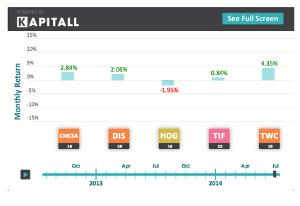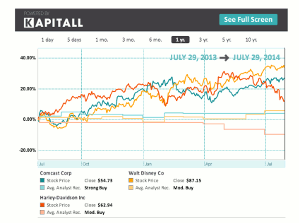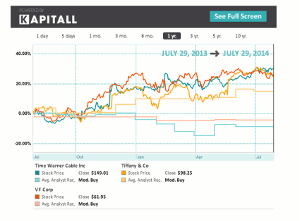If consumers do start spending again, it seems like discretionary goods stand to benefit the most, so the staff at Kapitall.com highlights six stocks that could benefit immensely from a return to higher consumer confidence.
The Conference Board's Index of Consumer Confidence had a very strong month in July, sending it to a 7-year high according to Bloomberg.
Higher gas prices, stabilizing food prices, and, of course, falling unemployment (now at 6.1%) were behind the change.
The big question, however, is whether this will affect consumer spending, which has not improved despite most Americans claiming they're having an easier time finding jobs and securing higher wages.
We decided to look for companies that would benefit the most if consumers did start spending again, so naturally we focused on the consumer goods sector.
Consumer goods fall on a scale from discretionary (non-essential) to durable. To narrow our screen, we focused on discretionary goods, reasoning that more discretionary goods will benefit most from higher levels of consumer confidence.
Began our list using companies in the S&P 500 Discretionary Index, which is made up mostly of restaurant, hospitality, and other entertainment companies. When consumers tighten their belts, these are usually the first things to go.
We then narrowed the screen by looking for encouraging returns on equity (ROE), the amount of money a stock makes for every dollar of equity. However, since ROE can be manipulated by borrowing money, and can vary from sector to sector, we used the Dupont Analysis to refine our screen further.
Pioneered by the chemical giant of the same name, the Dupont Analysis breaks down ROE to see exactly where the higher figures are coming from. It does that by comparing a stock's profit margin and asset turnover to its peers, getting a more comprehensive picture of how the company is generating those returns.
We found 6 consumer discretionary stocks with encouraging Dupont Breakdowns. Do you think they will benefit from higher consumer confidence?
1. Comcast Corporation (CMCSA): Provides entertainment, information, and communications products and services in the United States and internationally. Market cap at $140.7B, most recent closing price at $54.39.
MRQ net profit margin at 10.75% versus 9.39% y/y.
MRQ sales/assets at 0.11 versus 0.098 y/y.
MRQ assets/equity at 3.077 versus 3.245 y/y.
2. Walt Disney Co. (DIS): Operates as an entertainment company worldwide. Market cap at $149.34B, most recent closing price at $86.23.
MRQ net profit margin at 16.46% versus 14.34% y/y.
MRQ sales/assets at 0.141 versus 0.13 y/y.
MRQ assets/equity at 1.84 versus 1.933 y/y.
3. Harley-Davidson, Inc. (HOG): Produces and sells heavyweight motorcycles, as well as offers motorcycle parts, accessories, and related services. Market cap at $13.96B, most recent closing price at $63.95.
MRQ net profit margin at 15.41% versus 14.26% y/y.
MRQ sales/assets at 0.177 versus 0.168 y/y.
MRQ assets/equity at 3.079 versus 3.513 y/y.
NEXT PAGE: Consumer Discretionary Stocks to Watch
|pagebreak|
4. Tiffany & Co. (TIF): Engages in the design, manufacture, and retail of fine jewelry worldwide. Market cap at $12.82B, most recent closing price at $99.33.
MRQ net profit margin at 12.41% versus 9.33% y/y.
MRQ sales/assets at 0.21 versus 0.192 y/y.
MRQ assets/equity at 1.696 versus 1.76 y/y.
5. Time Warner Cable, Inc. (TWC): Operates as a cable operator in the United States. Market cap at $41.33B, most recent closing price at $148.36.
MRQ net profit margin at 8.58% versus 7.32% y/y.
MRQ sales/assets at 0.114 versus 0.111 y/y.
MRQ assets/equity at 6.929 versus 7.106 y/y.
6. V.F. Corporation (VFC): Designs and manufactures—or sources from independent contractors—various apparel and footwear products primarily in the United States and Europe. Market cap at $26.6B, most recent closing price at $61.81.
MRQ net profit margin at 10.69% versus 10.35% y/y.
MRQ sales/assets at 0.278 versus 0.275 y/y.
MRQ assets/equity at 1.735 versus 1.865 y/y
By the Staff of Kapitall.com














